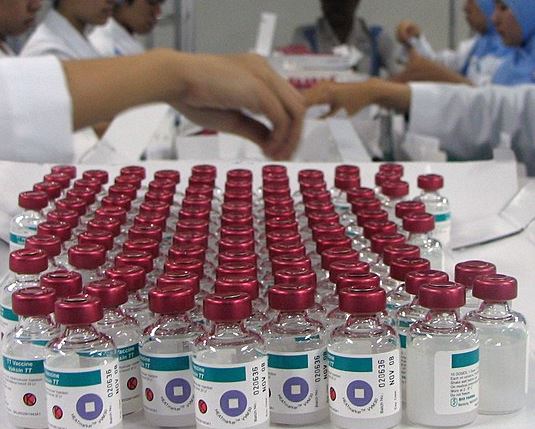By Shree Baphna, AsAmNews Staff Writer
Right now, most of our world is in dire need of a medical solution to the COVID-19 pandemic. The basic needs of millions are in jeopardy, but that is not all. Their basic rights could be at risk too. Specifically, I am referring to health rights and the right to affordable healthcare. As we speak, a Supreme Court judge is about to be confirmed to the bench, the ascension of whom throws the fate of the Affordable Care Act- amongst other necessary legislations- into turmoil. Many Americans depend on the ACA for healthcare, and the possible disposal of it during a pandemic could not be more cruelly timed.
One of the things a government subsidized healthcare plan would potentially cover is a COVID vaccine. Big Pharma companies will stop at nothing to try and weasel profits out of their vaccines (if approved), and those without the privileged protection of health insurance will suffer.
Already, we have seen this pandemic disproportionately hurt our Black, Latinx, Indigenous, and other POC communities. Women are also more economically, financially and socially at risk in light of this pandemic. As such, these are portions of the population that rely the most on subsidized healthcare. This could be because their socially disadvantaged identities deplete the wealth of resources at their disposal. If both a COVID vaccine and the Affordable Care Act are put out of reach for millions in the US, the effects of it can and will be devastating.
The intersectionality of race and gender is where our so-called values for a just and equal society turn into a black hole. Being female and a member of a racial minority manifests as double strikes on their standing along the privilege spectrum. Multiple publications report on how women- who make up the majority of frontline healthcare workers and informal sector employees- face the burden of propping up their careers and financial stability with the added, increased unpaid labor at home. All of a sudden, there are children at home, spouses and parents who need care, domestic tasks to take care of, etc. Women of minority communities face an added lack of racial privilege. They are more likely to hold lower paying jobs, are more likely to work in environments where social distancing is not an option, and are most likely to be the first to lose their jobs due to the imminent economic crisis.
Therefore, women from minority communities are in dire need of an affordable COVID vaccine, made available through proper government- subsidized healthcare. They are one of the most vulnerable populations financially and socially. For many women, a vaccine is the solution to them being able to resume their livelihoods in order to provide for themselves and their families.
However, barriers to an affordable vaccine don’t just stop at a lack of government healthcare. In addition to the exorbitant prices of vaccines, another big problem is patenting. Patents on any drug prevent that product from being manufactured by competitors for a period of 20 years. This time period was established by a World Trade Organization agreement called Trade-Related Aspects of Intellectual Property Rights (TRIPS). If a COVID vaccine is developed and a patent for it is put into place, pharmaceutical companies have an undisputed monopoly over the market for the vaccine and are not bound by any incentives to charge low prices. The patent would restrict who can manufacture the vaccine, essentially restricting other countries from manufacturing it as well. The vaccine would effectively become limited in supply and be produced only for certain populations- those who are able to pay the price.
It is barriers like this- patents and pricing- that work in the background, hurting many people in ways that are not visible on the surface. Women of color, as mentioned before, are more likely to earn less, are more likely to lack access to adequate healthcare, and are more likely to be in situations that puts them at risk of contracting COVID. Yet, they are also the population that faces the most barriers when it comes to accessing a potential vaccine. The abolishment of subsidized healthcare plans such as the Affordable Care Act can seriously jeopardize access to a vaccine, let alone due to pricing and legal barriers.
I cannot emphasize enough how much our country depends on its backbone of employees in lower-wage jobs, how much our world depends on the efforts of our women, and how much women of color in particular are at risk due to the COVID-19 pandemic. Healthcare is not a political game to play- it is a right that needs to be afforded to every person, regardless of race, gender, sexuality, ability, etc. If we assume lining the pockets of Big Pharma companies is the solution to propping up the healthcare system, we are sorely mistaken. The pandemic has only widened the privilege gap in communities. What we need to do is uplift those who are being trodden down, not boost those who have skimmed the top off of this healthcare crisis.
AsAmNews has Asian America in its heart. We’re an all-volunteer effort of dedicated staff and interns. Check out our new Instagram account. Go to our Twitter feed and Facebook page for more content. Please consider interning, joining our staff, or submitting a story.


